|
BOB SIMONSON, Program Leader
QUANTIFYING FECAL COLIFORMS Kim Clarkin , Project Leader |
||

San Dimas Technology
& Development Center
444 E Bonita Ave
San Dimas, CA 91773
(909) 599-1267
| Incubators | QA/QC | Batteries & Inverters |
INCUBATORS
Points that apply to all incubators:
- Incubators take time—longer when ambient temperature is cooler--to come up to temperature and stabilize. They should be warmed up before samples are processed. (For example, Millipore incubator heats at 8C (14.4F) per hour.)
- Some incubators have continuous dials that the user needs to work with, checking the actual temperature inside the chamber and readjusting the dial—perhaps several times—before achieving the desired temperature. This adds time to the warm-up.
- Opening the incubator door to insert samples or check temperature has a strong effect on temperature inside the chamber. To maintain the stable temperature required for each test, open the incubator as little as possible when samples are inside.
- If you expect ambient temperature to exceed the incubation temperature, ensure the incubator is well insulated, or keep it inside an air-conditioned vehicle. Incubators do not cool.
We tested three incubators—two designed for field use but not large enough to hold the Quanti-trays. The third was a bench top model large enough to hold the Quanti-trays without rolling or folding.
Both the Hach Corporation and Millipore Company sell portable incubators designed to hold petri dishes. The incubator at left, below, comes with Hach’s MEL/MF total coliform laboratory kit (the MEL/MF components are used in our membrane filtration kit for fecal coliforms).
Figure 18. Incubators tested for membrane filtration kit.
a) Hach Co. portable incubator with battery eliminator b) Millipore Co. single chamber portable incubator
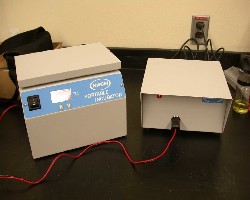 |
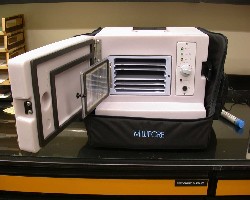 |
Portability - The Hach incubator is small and light, and has a 4-foot long cord that plugs into the vehicle's cigarette lighter or power port. When it is plugged in, you will need to find a way to secure the incubator on the seat or the floor. A rechargeable 12-volt battery pack and an adapter for use with AC power outlets (‘a battery eliminator’) can each be purchased from Hach separately. We did not test the battery pack, but its advertised capacity is 12 hours, half the length of a complete incubation cycle.
Performance - Temperature stability is very important for the fecal coliform test, where incubation temperature should not vary more than + 0.2C. Temperature is allowed to vary somewhat more for E.coli: + 0.5C. Using a Hobo thermograph, we measured internal temperature in both the Hach and Millipore incubators during several incubations. The Hobo is not accurate enough to verify the range of temperature variability when an incubator is set to a constant temperature. However, it did show the effect of opening the incubator to insert or remove a sample (Figure 19).
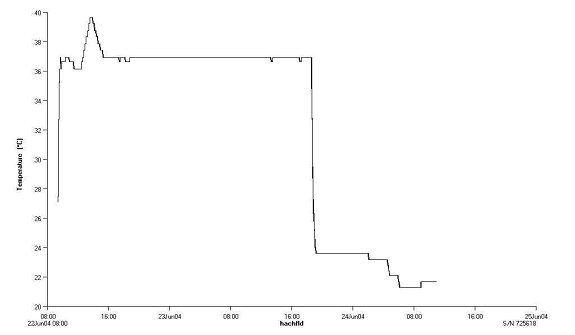
Figure 19. In this field test, the Hach incubator was set to 35C. The small dips indicate when the top was opened to remove or insert samples. The midday heat caused the temperature to spike, and the instrument did not recover until it was returned to the lab at approximately 17:30. There, it stabilized at 36.9C. The large drop at the end is when the HOBO was removed from the chamber.
Figure 19 shows that the Hach incubator does not necessarily stabilize at the set temperature. It is necessary to check it with a thermometer and adjust the dial when outside conditions change.
Figure 19 also shows that on a very hot day (probably about 38C), the Hach incubator exceeded the 35C temperature needed for E.coli incubation while in transport in the truck. This result is not surprising; none of the incubators would be expected to maintain the set temperature when ambient temperature exceeds it. These machines do not cool, and they must be well insulated and kept at least slightly cooler than incubation temperature in order to function.
Cost – This incubator comes with the Hach MEL/MF Mobile Environmental Laboratory which totals $2645. Purchased separately, with the battery pack and AC adapter, cost is approximately $1326.
We preferred the Millipore single-chamber field incubator for the fecal coliform kit. In addition to being lightweight and reliable, it comes with versatile power options.
Portability – The machine is light, and the carrying case has a handle at the top. It comes with a battery that fits in a special compartment on the machine, which is convenient during transport. The battery pack should power the incubator for 12 hours at room temperature, according to the manual. The incubator is larger than the Hach, and somewhat easier to secure on the passenger seat if you are powering it from the vehicle battery.
Performance- According to specifications supplied by the company, the Millipore incubator meets EPA requirements for temperature stability for fecal coliform incubation (+/- .2o C). The Hach does not (it is not designed for fecal coliform determinations), though with our limited tests, we did not detect differences between samples incubated in the two.
The Millipore incubator had the best temperature consistency of any of the incubators. As shown in Figure 20, it held the set temperature well, except when the door was opened.
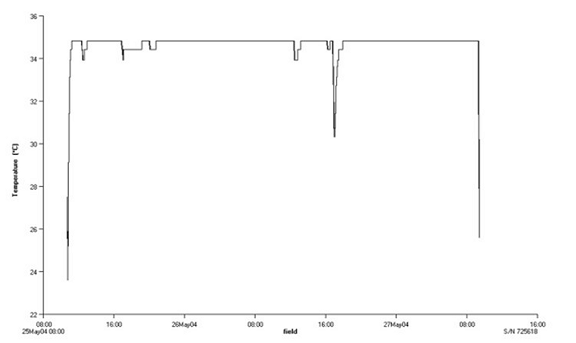
Figure 20. This shows the Millipore incubator's performance in the field trial when set at 35C. Samples were put in the incubator at 12:34, 17:02, and 20:08. The incubator re-stabilized (at 34.8º) at 13:04, 19:14, and 20:54, respectively. The temperature drop at 17:12 on the second day was caused by temporarily removing the HOBO from the incubator.
For the Millipore incubator, ambient temperature should be 3C (5.4F) cooler than the incubation temperature of 112F. The Hach incubator requires a 5C (9F) difference. Since fecals are incubated at such a high temperature, cooling the incubator is generally not necessary; however, if needed, blue ice can be used inside the kit box. The E.coli temperature is lower, and cooling the incubator may be a necessity. Temperature stability is one reason the kit box should be lined with insulating foam.
After a few months of use, both the Hach and Millipore incubators required adjusting, since the chamber temperature was not always the same as the temperature that had been set on the dial. The dial for the Millipore unit turns only to fixed points; consequently, temperature drift cannot be corrected by making slight adjustments to the dial position. Interestingly, however, the temperature problems with this incubator spontaneously resolved after a few days. The Hach incubator was less stable; however, since it can be set to any temperature in a given range, adjustment using the dial is easy.
The important points are to check the thermometer inside the incubator and, if necessary, adjust the temperature whenever the unit is opened to insert or remove a sample. Other than that, it is best to avoid opening the unit, since a certain amount of time is required to stabilize the temperature again after it is closed.
Cost- $2159 in 2004. This incubator has the most flexible power options: a rechargeable battery pack and charger, and an AC power cord come with it. The cigarette lighter adapter and battery cables (for hooking the unit up to a separate 12V battery) can be purchased separately from Millipore's repair department. The Millipore incubator does not require an inverter when used with a 12V battery.
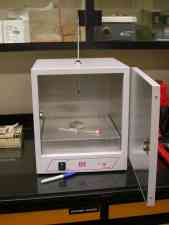
Figure 21. Lab-line benchtop incubator
The longest dimension of the IDEXX Quanti-trays is larger than the longest dimension of the Hach and Millipore incubator chambers. Trays can be rolled and inserted into the chambers, but their bulk permits only six to be squeezed into the Hach, and only four to fit into the Millipore. Trays should not be cut in half to fit them into the smaller incubators because they will leak.
To accommodate several samples, splits, and blanks, we tested the Lab-line model 120, which has a significantly larger chamber (Figure 21). This incubator is not designed for field use and it uses substantially more power than the field models. According to Lab-lines’ specifications list, the incubator exceeds the temperature stability and accuracy required for E.coli of +.5C. In our limited field testing, the thermometer that comes with the incubator showed that temperature did vary, and there was some difficulty achieving the correct temperature.
The IDEXX Company sells two incubators large enough to hold the Quanti-Trays, but we did not have the opportunity to test them. The cheaper one ($500) is similar to the Lab-line in that it has a continuous dial that requires adjusting to achieve the correct temperature, and an alcohol thermometer that protrudes from the top. The thermometer is breakable and somewhat inconvenient.
Portability- While still manageable, the Lab-line incubator is the heaviest of the three tested. Its thermometer protrudes through the top, and can break during transport.
Because it is designed to be a bench top model, it uses more power than the portable incubators (8 amps on a 12V battery: about 100 watts). In the field, the vehicle lighter or battery will power it via a 350W or larger inverter. A set of deep cycle batteries capable of supplying 200 amp-hours is needed to power the inverter where 120V AC power is not available.
Occasionally, the set temperature can be changed if the dial rubs against something.
Performance- The SDTDC tester had difficulty achieving the set temperature (Figure 22) with this incubator. The temperature dial does not have degree marks and the user must check a thermometer regularly if conditions are changing.
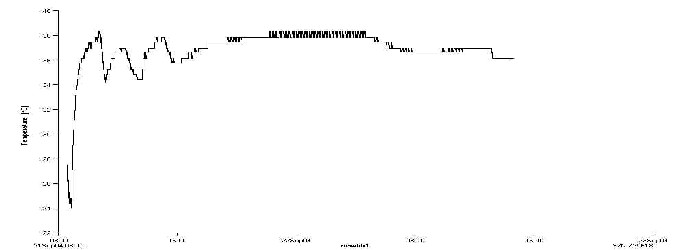
Figure 22. This temperature trace shows the problem the tester had achieving the correct temperature of 35C. The dips at the beginning of the test are when samples were put in. The variations that show up even when the machine is maintaining a generally stable temperature are probably due to the machine cycling on and off to maintain set temperature.
Cost- The Lab-line is one of the least expensive incubators on the market--about $350 in 2004.


